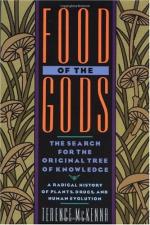|
This section contains 314 words (approx. 1 page at 400 words per page) |

|
Summary and Analysis
In "The Magic in Food," McKenna discusses the unappreciated role of plants in mediating human culture and relationships. Foods can elicit specific emotional responses and behaviors. Additionally, plants can serve medicinal purposes as in the example of the Aspilia leaves which contain bacteria-killing properties and are commonly used to treat wounds and stomachaches.
The conversion of the human as an omnivore - an organism that ate anything foodlike, including plants and other animals - gave rise to eating as an experience and to genetically variant individuals, which would increase human success. Humans and plants co-evolved, each mutually benefiting from the other in a shared relationship.
Human evolution has been markedly fast compared to typical courses of evolution. The brain of early hominids increased in both size and complexity over a relatively...
(read more from the Food of the Gods: The Search for the Original Tree of Knowledge Summary)
|
This section contains 314 words (approx. 1 page at 400 words per page) |

|




